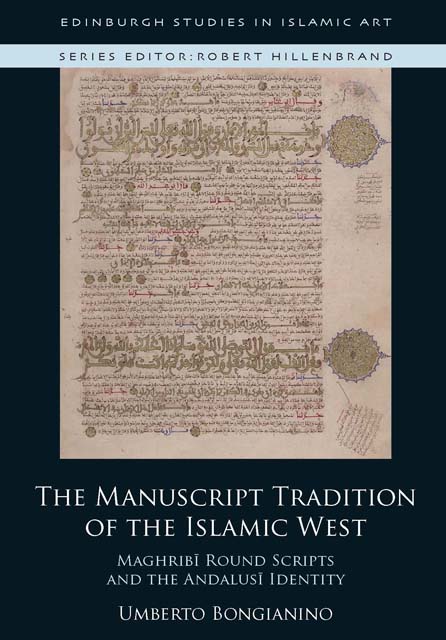Book contents
- Frontmatter
- Contents
- List of Figures
- Acknowledgements
- Note on Transliteration and Translation
- Abbreviations
- Series Editor’s Foreword
- Introduction: A Book about Books
- Chapter One Maghribī Round Scripts: A New Definition
- Chapter Two Maghribī Round Scripts in the Third/Ninth and Fourth/Tenth Centuries
- Chapter Three Maghribī Round Scripts in the Fifth/Eleventh Century
- Chapter Four Maghribī Round Scripts in the Sixth/Twelfth Century
- Chapter Five Beyond Books: Quranic Manuscripts and Chancery Documents
- Conclusion: Inscribed Identities
- I List of Dated Manuscripts
- II Titles and Genres of Dated Manuscripts
- III Copyists of Dated Manuscripts
- IV Places of Copying
- V Remarkable Colophons and Notes
- Glossary
- Bibliography
- Index
Chapter Four - Maghribī Round Scripts in the Sixth/Twelfth Century
Published online by Cambridge University Press: 18 November 2022
- Frontmatter
- Contents
- List of Figures
- Acknowledgements
- Note on Transliteration and Translation
- Abbreviations
- Series Editor’s Foreword
- Introduction: A Book about Books
- Chapter One Maghribī Round Scripts: A New Definition
- Chapter Two Maghribī Round Scripts in the Third/Ninth and Fourth/Tenth Centuries
- Chapter Three Maghribī Round Scripts in the Fifth/Eleventh Century
- Chapter Four Maghribī Round Scripts in the Sixth/Twelfth Century
- Chapter Five Beyond Books: Quranic Manuscripts and Chancery Documents
- Conclusion: Inscribed Identities
- I List of Dated Manuscripts
- II Titles and Genres of Dated Manuscripts
- III Copyists of Dated Manuscripts
- IV Places of Copying
- V Remarkable Colophons and Notes
- Glossary
- Bibliography
- Index
Summary
Book culture and production in Almoravid and Almohad Iberia
STARTING FROM 483/1090, the gradual Almoravid conquest led by Yūsuf b. Tāshifīn resulted in major political changes for al-Andalus. The ruler was again one, boasting the pseudo-caliphal title of amār al-muslimīn (‘commander of the Muslims’), and under his authority all the Muslim territories of the peninsula were eventually reunited. However, as Berber leaders with their capital in Marrakesh, the Almoravid emirs were only occasionally present on Andalusī soil, to receive the allegiance of the local administrators and wage jihād against the armies of the Christian kings in the North. This meant that the new political centralisation was not matched by a cultural one, and different Iberian cities continued to act and rival each other as thriving intellectual and artistic centres. From the former capitals of the ṭāifa kingdoms, now run by military governors drawn from the Almoravid clan, came the vast majority of the viziers, chief judges, imams and court functionaries appointed by the new rulers, and in particular their chancery secretaries, who were selected from among the same urban elites favoured by the previous kings.
The important intellectual centre of Zaragoza was lost to the Christians in 512/1118, only eight years after ʿAlī b. Yūsuf had seized it from the emirs of the Banū Hūd. On the other hand, Seville, Cordova, Valencia, Granada and Almería continued to represent the main cultural poles of Almoravid Iberia, as suggested among other things by the number of scholars mentioned in Ibn al-Abbār's Takmila who died in these cities between 540/1145 and 599/1203, or who visited them during the first half of the sixth/twelfth century. This continuity also embraces the period of the so-called ‘second ṭāifa kingdoms’ and of the Almohad takeover of al-Andalus in the second half of the century, with the sole exception of Almería, which entered a phase of decline after its capture and occupation by the troops of Alfonso VII between 542/1147–552/1157 and only seems to have flourished again during the seventh/thirteenth century. Under the Almohad caliphs, also of Berber origin and also ruling from Marrakesh, the cities of al-Andalus continued to prosper as centres for learning and manuscript production.
- Type
- Chapter
- Information
- The Manuscript Tradition of the Islamic WestMaghribi Round Scripts and Andalusi Identity, pp. 171 - 276Publisher: Edinburgh University PressPrint publication year: 2022



